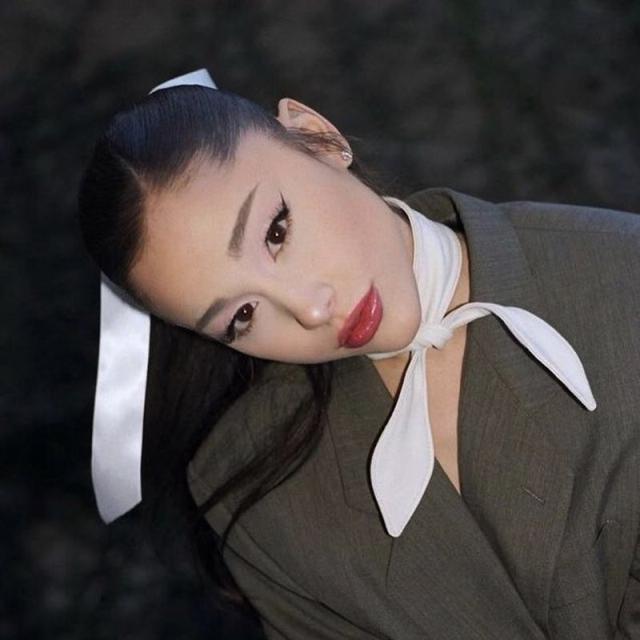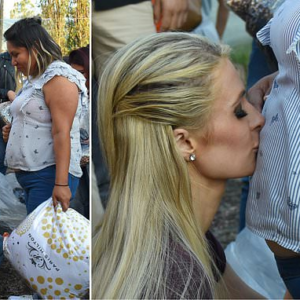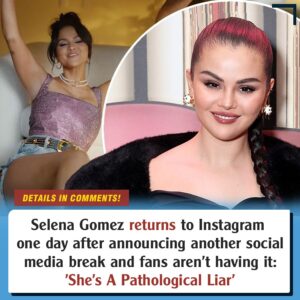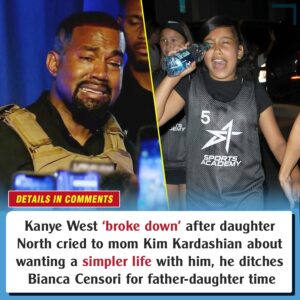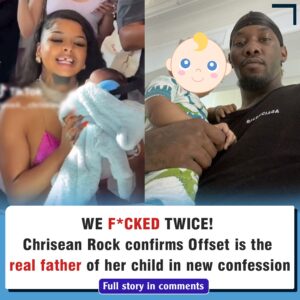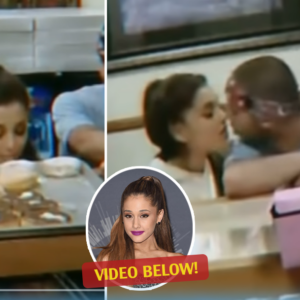When I first saw Ariana Grande’s most recent Instagram photo, I didn’t even realize it was her.
I honestly thought I was looking at a K-beauty influencer or K-pop star. And no wonder; in the photo, Grande is posted up at a beauty counter to celebrate her R.E.M.
Beauty makeup line launching at Ulta, wearing an all-pink outfit, her trademark high pony—and a makeup look that was giving, well, yellowface.
The angle of her winged liner and the way her eyeshadow is applied makes it look like she has monolids, while the editing of the photo (or maybe the flash) makes her skin appear much lighter than her usual questionably dark tan.
The overall effect is not “Italian American, half Sicilian and half Abruzzese” as she tweeted in 2011, but rather the exact same type of racial cosplay that we are currently seeing all over TikTok and Instagram.
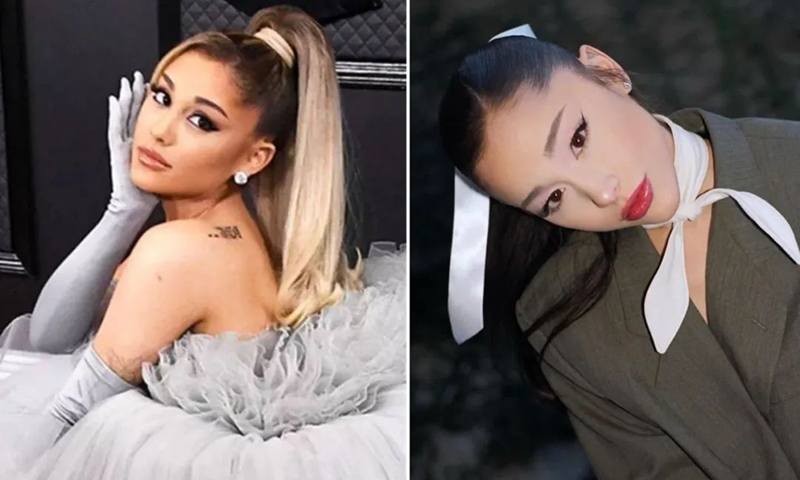
In Ariana Grande’s most recent Instagram post (left) she appears to have monolids and lighter skin than in other recent photos (right). (Images: instagram.com/arianagrande).
… Which is why I was kind of surprised to see little to no news coverage about these images.
To be fair, the last time Grande posted photos where she appeared to have monolid eyes and lighter-than-usual skin (back in December), there wasn’t much coverage, either.
What did exist was relegated to tabloids, with just a few mainstream publications wading into the debate—and even then, they made sure to note that not everyone saw a problem with her look.
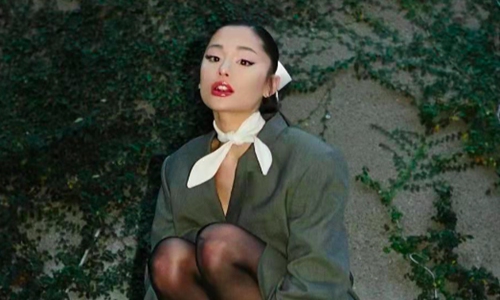
As Cosmopolitan UK pointed out at the time, “others have jumped to her defence, with one fan saying on Twitter that the comments were from non-Asian people but that many Asians and South East Asians didn’t notice.
While another pointed out that Ariana respects Asian cultures and cultures around the world.
Others have also said that her skin would be lighter in winter, or could be down to the camera flash.”
But at least that was something. This time around? Crickets.
Maybe these outlets think conversations about Asianfishing, or yellowface, or whatever we’re calling it these days, are played out.
Or maybe they think the reaction they’d get from Grande’s stans isn’t worth it. (Which… fair.)
But I do think these images are worth talking about because, much like when we all spent a lot of time discussing Grande’s Blackfishing, her aesthetic choices illuminate problematic dynamics in our society that are, unfortunately, extremely timely.
(If you missed the Blackfishing convo, it’s a term coined by Toronto cultural critic Wanna Thompson for white women who cosplay as Black on the internet; this is a good breakdown of how Grande did it.)
Pretending to be Asian—on the internet and otherwise—is a whole thing
Grande and her makeup artists didn’t land on this look by chance. Internet subcultures that basically amount to Asian fetishism have existed for years, if not decades.
Anime and K-pop fans are likely already familiar with the derogatory terms “weaboo” and “Koreaboo,” which are sometimes used to refer to people who are so obsessed with the cultures of Japan and Korea respectively that they pretend they actually are Japanese or Korean, discarding their own ethnic and cultural backgrounds in favour of performing an appropriated version of Asianness on the internet.
More recently, a trend has emerged among YouTubers, Instagrammers and TikTokers to use makeup, filters and camera angles to mimic stereotypical East Asian features.
I’m so in love with @ArianaGrande new Asian look. It looks so cute and oriental.
Welcome to the TRANSRACIAL club Ari, so happy to have you join me. Can we become the King & Queen of Korea together already? #olilondon #ArianaGrande #transracial pic.twitter.com/coWlW0idQS

This happens offline, too, of course.
Oli London, a white British internet personality, has undergone several plastic surgery procedures to look more like BTS’s Jimin and even goes so far as to identify as “transracial Korean,” which is obviously not a thing.
(They were a huge fan of Grande’s December photos, btw.)
And remember the fox eye makeup trend that was everywhere in summer ’20?
In addition to the actual makeup, which involved drawing on a straight brow and using eyeshadow to create the illusion of narrower, upturned eyes, influencers who tried it also posted photos in a very particular pose: fingers pulling their eyes back toward their templates to exaggerate the slanted effect.
It’s one I know you’ve seen before, though in a slightly different context.
As writer Sara Li argued in Teen Vogue, “it is not accidental that mainstream beauty standards would, yet again, steal select features from another culture, when that very same feature has been weaponized against its origin community in the past.”
Between Scarlett Johansson, Simu Liu, and Gemma Chan, I can’t believe we are getting THREE Asian led marvel movies back to back. Asians stay winning #Eternals
Or, we can go back even further.
There is a very long history of white actors wearing makeup, prosthetics and costumes to not just mimic stereotypically East Asian features but also to embody an offensive—and specifically American—idea of Asianness that doesn’t authentically reflect the region’s cultural diversity.
And I’m not just talking about historical Sinophobic characters like Fu Manchu, the original model minority, Charlie Chan, or WW2-era anti-Japanese cartoons; in the 2010s alone, Sherlock Holmes, Cloud Atlas and How I Met Your Mother used actual yellowface, while Aloha, Dr. Strange and Ghost in the Shell, which all cast white women to play Asian characters.
Do we really still have to talk about treating other ethnicities’ physical features as costumes?
Grande has never publicly commented on any of her racial cosplay adventures, but her fans are quick to offer up excuses: that this is solely an aesthetic choice, that it wasn’t an intentional slight, that characterizing small or slanted eyes as Asian is racist in itself because people from any ethnicity can have that particular eye shape.
That last part is true, which is why it’s wrong (and anti-Black) when commenters lob the term Asianfishing at Black creators who naturally have monolids or almond-shaped eyes.
But in general, this is a bad-faith argument.
It would be extremely silly to pretend that this eye shape isn’t prominent among East Asian people, and more importantly, that Western society hasn’t spent generations mocking all Asians for it.
In America, people tend to forget the breadth of the Asian continent: Korea, Japan, and China, yes, but Thailand, Malaysia, India, Bangladesh, and other countries as well, filled with single lids and double lids, eyes of brown and black and hazel.
Yet the monolid has come to symbolize a vague notion of Asianness, reducing billions of people to three simple strokes.”
The annoying thing is that horrible fans of this celebrity doesn’t understand why a white woman is trying on Asian features when publicly having Asian features right now can result in your getting pushed in front of a subway or punched in the face 100 times.
This is not really about eyeliner, the same way conversations about Grande’s Blackfishing aren’t about self-tanner.
It’s about how dehumanizing it is when young, mostly white women separate racialized peoples’ physical characteristics from our ethnicities so they can ‘try on’ the parts of us they find most aesthetically pleasing.
It’s about taking the very same characteristics that Western society said made racialized people different, undesirable and unworthy and repackaging them as beautiful—as long as they’re not on an actual person of colour.
And it’s about how this just keeps happening. We’ve had this conversation many (many) times before; Black, South Asian, Indigenous and East Asian features are regularly appropriated for aesthetics, clout and financial gain by people who don’t feel any corresponding responsibility to engage with the oppression that disproportionately affects these groups.
Worse, they’ll have us believe it doesn’t matter, that it’s just makeup, when actually it’s hypocrisy, callousness and racism.
Weirdly, there is an eye-shape connection here, too.
As Kim explains in her essay, ssanguhpul, the double-eyelid surgery that accounts for 23% of all plastic surgeries in Korea, is also a legacy of the American military.
Some highlights taken from data of self-reported and witness-reported incidents of anti-Asian racism and xenophobia in Canada from Jan. 1-Dec. 31, 2021. #StopAsianHate pic.twitter.com/uZkECAmRbs
After all, aren’t they all about taking the bits of Asian women that white people find most useful, then metaphorically—or literally—discarding the rest?
News
Paris Hilton kissed a women’s belly thinking she was pregnant. Her heart was in right place 😂
Paris Hilton she kisses her belly of a pregnant woman during a visit to the reconstruction of houses damaged by the 2017 earthquake on November 12, 2018…
Selena Gomez returns to Instagram one day after announcing another social media break and fans aren’t having it: ‘She’s A Pathological Liar’
We can’t keep up with Selena Gomez and her on and off social media breaks. The 31-year-old Only Murders in the Building actress returned to Instagram just…
Kanye West ‘broke down’ after North cried to Kim Kardashian and ‘ditched’ Bianca Censori
Kanye West reportedly “broke down” when he heard his daughter North wanted to live with him, so he whisked her away to Dubai. Kanye West and his…
Chrisean Rock confirms Offset is the real father of her child in new confession
Offset confirmed as Chrisean Rock’s child’s father! Final unveiled! Is this why Cardi B is upset? In a surprising twist, Offset, the renowned rapper and one-third of…
IT’S FAKED??? Brandon Howard DNA test FAKED? Real LAB releases the result!! Michael Jackson may not have fathered secret son!
The DNA test which allegedly proved Michael Jackson fathered a secret lovechild may be fake. Fans of the late singer reacted with shock and outrage after online…
DISGUSTING: Ariana Grande secretly licked a donut without paying for it, spit on merchandise
Ariana Grande once got banned for life from a donut shop after being really weird and licking a bunch of donuts. Oh, for the heady days of…
End of content
No more pages to load
